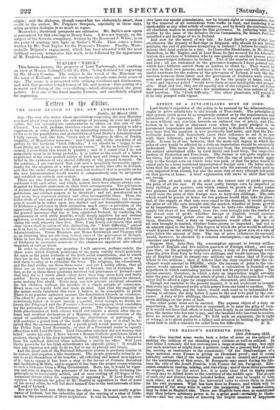EFFECT OF A FIVE - SHILLING DUTY ON CORN.
Lord Derby's exposition of the policy to be pursued by his Administration ought to prove satisfactory to the friends of Free-trade. The principles of that system could never be so completely ratified as by the acquiescence and submission of its opponents. If anoti.er harvest and another seed-time are to pass without any reaction towards an enforced rise of prices, and Pro. tection is to be kept in abeyance even when the party pledged to its paramount importance and imminent necessity is flushed with success, we may hope that the question is now practically laid aside, and that the Pro- tectionist leaders will henceforth exert their influence to set it at rest with their followers, and to hinder it from being the cause of further strife. It may be of use, however, that the mode and degree m which the price of corn would be affected by a duty on importation should be accurately understood. This seems the more necessary from the misapprehension on the subject entertained alike by Lord Derby and Lord Grey, the respective leaders of Protection and Free-trade. The former is not quite explicit in his views, but seems to conceive either that the rise of price would apply only to the foreign corn on which duty was paid, or that the price would be raised only by a more restricted importation of foreign corn; the latter main- tains that the rise of price would cqual not only the amount of.duty paid on corn imported from abroad, but also the same rate of duty (though not paid) on that grown at home. A brief explanation will serve to show that both are wrong.
The price of such corn as is sold at the lowest rate of profit governs the price of all the rest. If the most costly foreign corn be imported at forty shillings per quarter, corn which cannot be grown at home under two guineas must be driven out of the market. A duty of five shillings would raise the price of this foreign corn to forty-five shillings. The corn which would be grown at home for two guineas would then take its place s and, if the supply at that rate were equal to the demand, it'would govern the price of all the corn brought into the market, whether of home growth or by importations. The price would then be forty-two shillings. If the supply fall short of the demand, then the corn brought into the market at the lowest rate of profit, whether foreign or English, would exercise- the same governing power over the price of all the rest. It is ob- vious, therefore, that a duty on importations would affect the price of all corn brought to market, whether home-grown or imported ; but not to. an amount equal to the duty. The degree in which the price wouldbe affected would depend on the ability of the farmers at home to grow corn at a rise of price below the amount of duty. The rise of price (whatever its amount), would, however, be checked by a reduced consumption,—an injury both to. consumer and producer. Seppose that, duty-free, the consumption amount to twenty million quarters of English and five million quarters of Foreign wheat.; and sup- pose that, on the principle explained above, a duty of five shillings would raise the price from forty to forty-two shillings, and would increase the sup- ply of English wheat to twenty-one millions and reduce that of Foreign wheat to two millions ; then it follows that the duty received into the ex- chequer would amount to 600,0001., while the increase of price to the con- sumer would amount to 2,600,0001. Such a calculation is founded on an hypothesis in which contending parties could not be expected to agree. The precise amount, therefore, in which a duty on importation might actually raise the price of food, would not admit of proof; but the obnoxious fact would never fail to afford a topic for exaggeration, discontentsand clamour. Though not essential to the present inquiry, it is not irrelevant to remark that every tax is enhanced as the article passes from one hand to another. The importer, the miller, and the baker, would each need to be indemnified for- having to advance the duty before it came in the end tote paid by the con- sumer. A duty of five shillings, therefore, might operate as a rise of six or seven shillings on the price of food. One other point must not be omitted. The express object of a duty on importation, SE far as protection is concerned, is to raise the price of corn. If it would not have that effect, or would have it only in an inconsiderable de- gree, the farmer who has rent. to pay, and the landlord who has rent to receive, have no interest in the matter. To hold such an argument, (be it right or wrong,) is to plead guilty to a fallacy and delusion in bidding the agricul-
turist look to such a resource for relief from his difficulties. A. B.


























 Previous page
Previous page